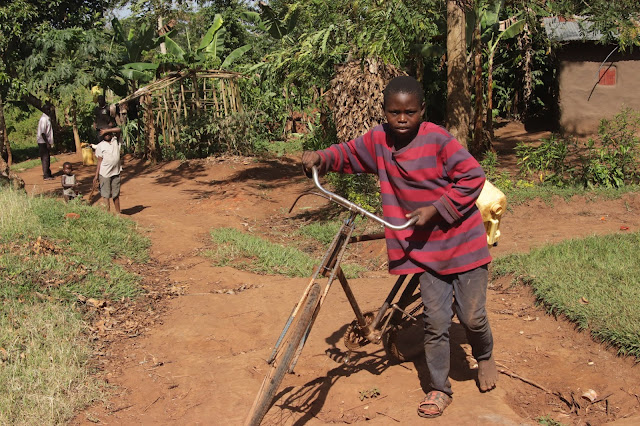Day 10 - Stunting in Uganda
Uganda is located in what we call tropical Africa, a
green belt around the equator. Warm and humid, ideal for growing crops. When
traveling through Uganda, you immediately get the impression that the Ugandans have
everything in terms of food. There are huge plantations and agricultural areas
that meet basic needs. The local markets offer a wide range of fresh fruits and
vegetables. You do not have to go hungry in Uganda. But still…
There is a huge problem of malnutrition in the country.
Not that Ugandans are running emaciated, they are malnourished by one-sided
high-calorie food. And that has a problematic consequence. Currently, 1/3 of
children in the age category up to five years old are stunted, i.e. they are
stunted in their growth. And that not only physically, but also mentally. Scans
of these children show clearly reduced brains that cannot make all cognitive
connections.
And that malnutrition already starts in the womb, because
pregnant women have a completely wrong diet. They eat plentifully thick
porridge that makes the feeling of hunger go away, but is by no means the basis
of a healthy diet. After birth, that pattern is continued by only giving breast
milk far beyond the usual six months. In addition, there are the particularly
difficult hygienic conditions in which people grow up, both in the city and
certainly in the countryside.
You understand that with impaired cognitive abilities,
these children have it particularly difficult at school, something that will
haunt them for the rest of their lives. They will continue to experience the consequences
later in the labor market. And if so many are affected in the active labor
market, it will also impact the country's economy.
Tonight we spend the night on Lake Victoria, with
well-known Belgians Johan Van Hecke and Els De Temmerman who together manage the
Kaazi Beach Resort hotel just outside the capital Kampala.
Els De Temmerman is a former journalist who worked at
VTM, BRNT and De Volkskrant, among others. As a correspondent for De Morgen,
she was in both Rwanda and Uganda during those horrible nineties. She was
passionate about Africa and was therefore the Africa correspondent par
excellence. Uganda was tied then in a civil war (which lasted until 2006) in
which the government army fought against the Lord's Resistance Army, a rebel
group from Northern Uganda. The rebel army used and still uses the so-called
child soldiers. Children are regarded as ideal soldiers: they are small and can
quickly and relatively invisibly walk through bushes. In addition, they are
agile and also very obedient. They are manipulable and due to a lack of
awareness of danger, they throw themselves rashly into their assignments.
Thousands of children were kidnapped and conscripted into the rebel army.
Children trying to escape were horribly murdered. Those who were liberated have
suffered massive psychological damage.
As a correspondent, Els de Temmerman witnessed the
kidnapping of these children in Uganda in 1998. She wrote a book about it, ‘The
Girls of Aboke’, the story of the kidnapping of 139 girls from an elite school
in Northern Uganda. That book was continued in ‘And then I had to bite my
brother to death’. Later, she also opened a center in Uganda to help child
soldiers, with the aim of integrating these children back into society. My
daughter sponsored one of these children at the time. After closing the center,
because there was no longer any need, Els De Temmerman now plunges into the
stunting problem in Uganda with great enthousiasm. One of the main tasks is to
make women aware of a healthy and balanced diet and to give each of them access
to fruit and vegetables, whether they live in the countryside or in the city.
That is why she, in collaboration with specialists in this field, conceived the
idea of easily providing future mothers with the necessary basic nutrition. To
state it simply : fruits and vegetables in a large bag, in which the crops can
also grow and be cultivated. And that is even possible in a small apartment in
the city. In this way they hope to put the women on the right track for a
healthy pregnancy and also to teach them to feed their children in a healthy
way. Let's hope that with the same enthusiasm with which she tried to give so
many child soldiers a future, she will be able to make Uganda's youth
healthier. Because if one cannot stop the stunting, the next generations will
become the lost generations of Uganda.




Comments
Post a Comment